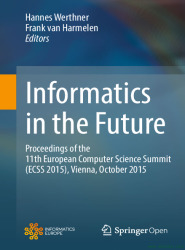Informatics in the Future
Interdisciplinarity: how to do research
Ethics: what is our responsibility
Diversity: why are there so few women in informatics
Combining informatics, history and art: a special contribution.
This book is intended for all informatics researchers, in academia as well as in industry. It is our responsibility – not only as scientists but also as citizens – to make the public aware of the dichotomies and dialectic relationships of computer science.
Table of contents
| Pages : | 118 |
| Size : | 2.7 MB |
| File type : | |
| Downloads: | 74 |
| Created: | 2022-02-02 |
| License: | CC BY-NC |
| Author(s): | Hannes Werthner, Frank van Harmelen |

Warning: Trying to access array offset on false in /home/tutovnfz/public_html/article.php on line 233
Others Computer science Tutorials
Others related eBooks about Informatics in the Future
The Haskell School of MusicDownload free course The Haskell School of Music, pdf file on 441 pages by Paul Hudak, Donya Quick....
Artificial Intelligence: Foundations of Computational Agents, 2nd EditionThis text is a modern and coherent introduction to the field of Artificial Intelligence that uses rational computational agents and logic as unifying threads in this vast field. Many fully worked out examples, a good collection of paper-and-pencil exercises at various levels of difficulty, programmi...
TensorFlow RoadmapA deep learning is of great interest these days, the crucial necessity for rapid and optim..., download free TensorFlow tutorial in PDF (22 pages) created by Amirsina Torfi ....
Ray Tracing GemsThis book is a must-have for anyone serious about rendering in real time. With the announc..., download free Ray tutorial in PDF (607 pages) created by Eric Haines ....
Getting Started with InnerSourceDownload free course Getting Started with InnerSource, pdf file on 22 pages by Andy Oram....
Interpretable Machine Learning: A Guide for Making Black Box Models ExplainableThis book explains to you how to make (supervised) machine learning models interpretable....
DevOps for Digital Leaders: Reignite Business with a Modern DevOps-Enabled Software FactoryThis book provides digital leaders who are accountable for the rapid development of high-quality software applications a concise guide to designing, implementing, measuring, and improving DevOps programs that are tailored to their organizations....
A Practical Guide to TPM 2.0A Practical Guide to TPM 2.0: Using the Trusted Platform Module in the New Age of Security..., download free TPM 2.0 tutorial in PDF (392 pages) created by Will Arthur ....
Assembler Computing systemThis tutorial contain a basics informations about assembler and elements of computing systems ,a free training document under 22 pages for download....
Managed Software EvolutionDownload free course Managed Software Evolution, pdf file on 439 pages by Ralf Reussner, Michael Goedicke, Wilhelm Hasselbring, Birgit Vogel-Heuser, Jan Keim, Lukas Märtin....